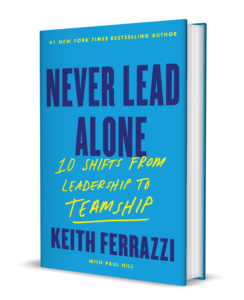As entrepreneurs and salespeople, referrals are our lifeblood because they jumpstart the trust-building with potential customers, partners and suppliers. In my last column I wrote about the oft-forgotten sales and networking tactic of asking our customers for referrals. Now, let’s switch hats for a moment. What happens when we’re the ones receiving the request? It’s certainly a familiar situation, because we’re as well-connected as they come.
Naturally, we’re always eager to refer a friend whose character and services we know well, but what do we feel when people we just met or we just agreed to buy from asks us to introduce them to our networks? Well, it depends. It depends on the level of intimacy we reached during our initial meeting or the sale. It depends on our excitement around the go-forward work our new contact is about to perform.
No need to fear being put in this situation, a relatively new contact asking you for a referral. At the end of the day, you hold all the power! And you should exercise it proactively. When I have established a basic level of trust with new contacts, I try to go overboard to suggest them to my friends and associates. I always think of this as a win-win, because for any new business my new contact gets with people in my network, I am helping my friends be more successful. So as soon as I trust my PR firm, I go out of my way to introduce them to others. From the moment I first connected with my therapist in NYC, I’ve recommended him to others. Same went for my doctor, my dentist, my financial advisor, and my clients who could possibly serve my other clients. I try to beat everyone to the punch — which I’d suggest you do too.
Of course, you don’t ultimately have to make the introduction. It’s the responsibility of your new acquaintance to give you a darn good reason why you should.
Say, for example, that I met someone who wanted me to introduce him to Phil Knight when Phil was CEO of Nike. If there were no clear purpose for the introduction, I’d probably choose not to. But if the new guy had three great reasons why he could better serve Nike, I’d see it as something good I could have given to Phil.
I’d just say, “Hey, Phil, I was thinking about your business the other day, and I thought I should introduce you to someone I met recently whose company could benefit Nike. Of course, it’s up to you, but I just wanted to pass on the reference.” It’s that simple. Then it’s within your friend’s normal business responsibilities to check out the prospect, so there’s no need to worry. Your friend won’t blindly buy something with their company’s or their own hard-earned money without applying their own rigorous thought process.
Inevitably, things sometimes go awry. Here is an example of how new contacts violated my trust by not being transparent before tapping into my network. It’s not a “business” example, per se, but it still applies and it’s relevant to my friend Phil Knight. I recently met a young man who clearly had great promise athletically, so I thought it would be a real thrill for him to perhaps get a tour of the Nike campus. I told the young man’s father that I’d be happy to introduce them to Phil. However, once I did, they directly solicited Phil for a donation of some kind. With the information I had beforehand, I thought making the introduction would be a good thing. Had I known their intention, though, I might have made the introduction in a different way.
If there comes a time when you are not comfortable before making a recommendation, just say so. Then explain that you would be happy to begin making recommendations, however, if a few criteria were met in the future. I recently was asked by one of our suppliers for referrals into my network, but I was reluctant because our supplier’s work had not been up to par. I told them that I’d love to make that intro, if he first showed me that such an intro would indeed be a favor to my network, that he start doing several things my firm had not experienced to date.
All that said, I recommend that you reach deep and start finding ways to make more referrals. And if the situation is right, do it even for people you just met or just started working with. Too many people see relationships as pies — where if you take a piece (in this case, introduce someone new to an existing contact) there won’t be as much left over for you. Relationships and networks are more like muscles. The more you work them, the bigger and stronger they get. Don’t mistake your relationships for pies and refuse to make referrals. If you do, you’ll miss out on many opportunities to help your friends and to help yourself.






